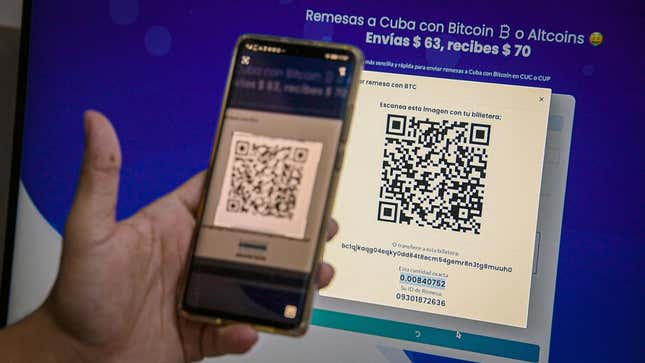
The Cuban government announced it will legalize and regulate cryptocurrencies for payments, according to a resolution published Thursday in Cuba’s Official Gazette and a new report from the Associated Press. But the details are incredibly scarce at this point.
Cuba’s Central Bank will lay out rules for how cryptocurrencies will be allowed to be used in the country, and while we don’t know practically anything about the rules yet, we do know payment for all “illegal activities” will still be banned, according to the resolution published Thursday. Crypto is incredibly popular for illegal activities, to say the least.
Remittances from the U.S. to Cuba have been largely blocked since 2019, following President Donald Trump’s reversal of the Obama adminsitration’s attempt at normalization of relations with the island nation. And the Biden administration has signaled that it has no intention of easing the crippling economic sanctions imposed on Cuba.
“There are a number of things that we would consider doing to help the people of Cuba but it would require a different circumstance or guarantee that they would not be taken advantage of by the government,” President Biden said last month, according to the Business Standard.
“For example, the ability to send remittances back to Cuba. I would not do that now because the fact is it is highly likely the regime would confiscate those remittances or big chunks of it,” Biden continued.
But cryptocurrencies may be one way for some people in the U.S. to start sending money to Cuba, especially if the Cuban government begins helping everyday Cubans set up the technology necessary to send and receive crypto like bitcoin.
The president of El Salvador, Nayib Bukele, announced back in June that the country would recognize bitcoin as legal currency starting September 7, which is not just a couple of weeks away. And to get ready, Bukele is trying to educate Salvadorans about how to send and receive cryptocurrencies and to incentivize the use of bitcoin. Bukele is even giving away $30 in bitcoin to every adult who signs up for the government’s cryptocurrency app, known as Chivo.
The crypto exchange Qbita already operates in Cuba, according to the Cuba Standard news outlet, with roughly 13,000 users. Qbita handled roughly $354,000 in transactions in 2020, according to the Standard, a drop in the bucket compared to the trillions exchanged through services like Binance around the world.
The news out of Cuba comes as wealthy countries around the world seek to better regulate cryptocurrency exchanges that often operate on the margins of the law, including Binance, which has recently been banned in countries like Germany, Japan, Italy, Malaysia, and Thailand, among a host of others.
How well will Cuba’s crypto experiment go? That remains to be seen, but you can bet that all eyes will be on El Salvador over the coming weeks and months. The country is tying its financial fortune to imaginary money that’s backed by precisely nothing but a whispered promise in the wind. And we’re about to really see whether that’s really that much worse than a promise from the U.S. Treasury.